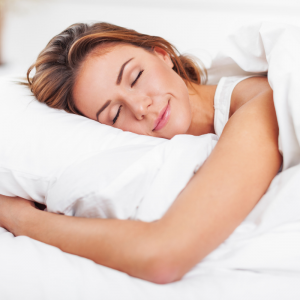 In last week’s post, Don’t Snooze, You Lose. Sleep to Your Health!, I discussed the health implications of insufficient sleep. This week, I cover how you know if you are getting enough sleep and provide some tips for satisfying slumber to improve the quantity and quality of your sleep.
In last week’s post, Don’t Snooze, You Lose. Sleep to Your Health!, I discussed the health implications of insufficient sleep. This week, I cover how you know if you are getting enough sleep and provide some tips for satisfying slumber to improve the quantity and quality of your sleep.
Before we dive in, I’d like to offer one last tidbit of food for thought on how important sleep must be for us as a species. Did you know that when you are in REM (rapid eye movement) sleep all the voluntary muscles in your body are completely paralyzed? Think for a moment about how vulnerable this makes us during sleep. We require 7 to 8 hours of sleep per night. So for 20% to 25% of that time (approximately 1.5 to 2 hours) we are completely vulnerable to attack by predators. This would make no sense from an evolutionary perspective unless sleep conveyed some very important advantages. Something to sleep on!
So how do you know if you are having truly satisfying slumber?
Ask yourself these questions …
Dr. Matthew Walker, whose book, Why We Sleep: Unlocking the Power of Sleep and Dreams, was the research source for much of last week’s post, suggests asking yourself the following questions:
- After waking in the morning, would you be able to fall back to sleep again just a few hours later?
- If you don’t set an alarm, would you wake on your own, or would you sleep right through the time you wish to wake?
- Do you find yourself reading the same material (in print or on your computer or tablet) over and over again and not taking any of it in?
If you answer “yes” to some or all of the above then you are likely not getting enough quality sleep. And here’s the kicker question:
- Can you function well without caffeine in the morning?
When you think about it, morning is the time of your day you should have the most energy. If you require caffeine immediately to get you going, then chances are you are short on satisfying slumber.
Dr. Walker refers to the SATED questionnaire as a simple survey that will allow you to determine your level of “sleep fulfillment” (you can download it here via the Supplementary Materials link). If you believe you are giving yourself enough time in bed, yet still are not feeling rested, you may wish to ask your family doctor for a sleep evaluation.
How can you improve the quality and/or quantity of your sleep?
Get to bed early enough and give yourself a full 8 hours in bed
We sleep in cycles of deep NREM (non-rapid eye movement) sleep and REM (rapid eye movement) sleep throughout the night, governed by our body clocks. Deep NREM sleep is the predominant phase early in the night. This is the most restorative and rejuvenating sleep stage, enabling muscle growth and repair. If you stay up 2 hours past when your body’s clock wants you in bed, you cut off 60% to 90% of your deep NREM sleep.
The REM phase of sleep predominates later in the night (into the morning). This sleep plays an important role in re-energizing your mind (as well as your body) and is associated with memory consolidation, learning and creativity. If you get up 2 hours earlier than your body’s clock wants you up, you deprive yourself of 60% to 90% of your REM sleep.
Be consistent about sleep and wake times
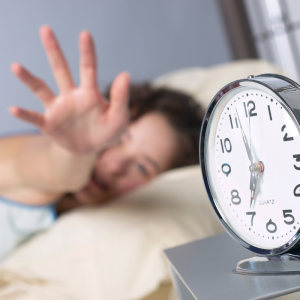
Keep sleep and wake times consistent and the same on weekends as week days. The goal is to be able to wake naturally without an alarm. A jarring alarm can cause a spike in blood pressure and a shock acceleration in heart rate.
In particular, avoid using the snooze button. This just adds further insult to injury by repeating this process one or more times. A better practice is to set a reminder alarm for when it is time to start winding down your day and head to bed.
I find it helpful to put in earplugs to avoid extra-early morning wake-ups. The world around me naturally gets louder around 5 a.m. as traffic increases and airplanes fly overhead. I can be awoken easily at that time as my sleep gets lighter closer to morning. The earplugs really help prevent that.
If I don’t have earplugs in, I use a free app on my phone called White Noise Generator by Relaxio. I like that it works offline. And I also like that you can custom-mix your own sounds (I have crickets and wind mixed together and I feel like I’m in the countryside).
Curb the caffeine
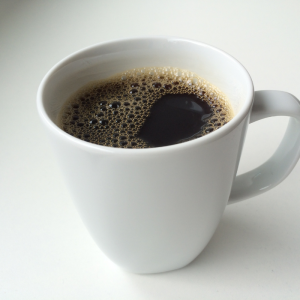 This is an interesting one and not likely to be popular. But I found it very telling that, when asked in an interview which of his research findings had the most impact on his lifestyle, Dr. Walker responded that he stopped drinking coffee.
This is an interesting one and not likely to be popular. But I found it very telling that, when asked in an interview which of his research findings had the most impact on his lifestyle, Dr. Walker responded that he stopped drinking coffee.
There are two factors that determine your sleep and wake times. The first is your 24-hour circadian rhythm (or body clock, as termed above) and most of us are familiar with this. The other is less familiar and it is called sleep pressure.
Sleep pressure is the increasing desire to sleep that is brought about by the build-up in our brain of a chemical called adenosine. Adenosine begins building in our brains from the moment we wake and tends to peak 12 to 16 hours later. When it peaks, we become very sleepy. During sleep the brain clears itself of adenosine and the whole cycle begins again.
What does caffeine have to do with this? Caffeine competes with adenosine at the site of the adenosine receptors in the brain, effectively muting this signal. And this is how caffeine keeps you alert when otherwise you would be sleepy. Which is fine (to an extent) if that is what you intend.
While levels of caffeine in your body peak after about 30 minutes of consuming it, caffeine has quite a long half-life of 5 to 7 hours. This means that 50% of the caffeine ingested is still in your system 5 to 7 hours later. So you may be experiencing its alerting effects well after when you intended. A late afternoon coffee could very well be inhibiting the quality and quantity of your sleep that night. This is particularly true for those who are genetically predisposed to have slower rates of caffeine clearance. I am one of these, which may explain why I have never really enjoyed coffee. It makes me far too wired!
Coffee is not the only culprit. Caffeine can be found in dark chocolate, certain teas, energy drinks and even some pain relievers. So, for satisfying slumber, keep caffeine to a minimum and earlier in the day.
Abstain from alcohol
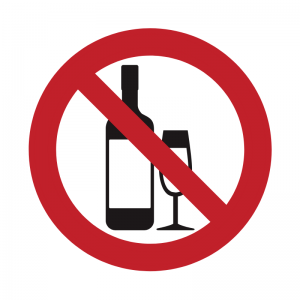 This is likely to be even less popular than reducing caffeine! While you may feel that alcohol helps you get to sleep, it is really more a sedative type of drowsiness that sets in and not proper deep NREM or REM sleep. In fact, alcohol is a sleep-disruptor and you likely aren’t even aware of the disruptions. According to Dr. Walker, “alcohol is one of the most powerful suppressors of REM (dream) sleep that we know of”. This is because the aldehydes that are produced as a byproduct of alcohol metabolism also block the brain’s ability to generate REM sleep. And this can happen even if consuming only moderate amounts in the afternoon or evening.
This is likely to be even less popular than reducing caffeine! While you may feel that alcohol helps you get to sleep, it is really more a sedative type of drowsiness that sets in and not proper deep NREM or REM sleep. In fact, alcohol is a sleep-disruptor and you likely aren’t even aware of the disruptions. According to Dr. Walker, “alcohol is one of the most powerful suppressors of REM (dream) sleep that we know of”. This is because the aldehydes that are produced as a byproduct of alcohol metabolism also block the brain’s ability to generate REM sleep. And this can happen even if consuming only moderate amounts in the afternoon or evening.
I have been tracking my sleep using the OURA ring since late last year and it has shown a very clear relationship between alcohol intake and poorer sleep, even at only 2 glasses of wine. One interesting measure is sleep efficiency (the percentage of time you actually spend asleep after going to bed). On average, my sleep efficiency is actually a few percentage points higher if I have just 1 glass of wine, but it starts to fall after that. Anything more than 2 drinks sends it plummeting by 10% (sometimes more).
The recovery index is another OURA ring measure and one where the “alcohol effect” is quite dramatic. This is a measure of how long it takes my resting heart rate to stabilize at night. You want it to stabilize within the first half of the night, ideally 6 hours before waking up, to give your body time to recover.
My recovery index shows a significant decline after only 1 drink, from an average score of 96.5 to 56.3 (out of 100). And not only does it take my heart rate longer to stabilize, my resting heart rate is also quite elevated these nights, meaning it is working harder. When I have no alcohol, my resting heart rate is around 45-47 beats per minute (bpm). If I have 1 drink, it rises to about 50 bpm. Two drinks or more sends it to 55-57 bpm (more than 20% faster). And this is during the time when your heart is meant to rest and recover. It is no surprise that alcohol consumption beyond recommended guidelines over time leads to high blood pressure, a weakened heart and irregular heartbeat.
So, to be honest, abstinence is best, especially on nights when you need a particularly good sleep. But feel free to enjoy your mimosas at weekend brunch! To be practical, follow the guidelines recommended by the Ontario Ministry of Health. For women this means 0-2 drinks per day, up to 10 drinks per week. For men it is 0-3 drinks per day up to 15 drinks a week. Personally, I usually do not drink at all Mondays through Thursdays and try to limit myself to half a bottle of wine on Friday and Saturday nights and maybe 1 drink on Sunday. The sleep disruption and low energy I have the next day, not to mention the wear and tear on my heart, just isn’t worth it.
See the light on light exposure
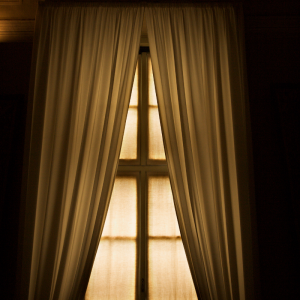 Artificial light, especially of the blue spectrum (in computers, TVs, tablets, mobile phones and so on), delays melatonin release in your brain, making it harder to fall asleep. So it is best to shut off your devices a few hours before bed. If you aren’t willing or able to do that, be sure to turn on the blue light filters on these devices and/or wear those yellow/orange tinged glasses that filter out blue light. While you may feel silly wearing them, they really do work! My husband bought a pair so he could read his tablet in bed at night. I felt like I was tucking myself in next to Bono the first time he wore them but I soon got used to it.
Artificial light, especially of the blue spectrum (in computers, TVs, tablets, mobile phones and so on), delays melatonin release in your brain, making it harder to fall asleep. So it is best to shut off your devices a few hours before bed. If you aren’t willing or able to do that, be sure to turn on the blue light filters on these devices and/or wear those yellow/orange tinged glasses that filter out blue light. While you may feel silly wearing them, they really do work! My husband bought a pair so he could read his tablet in bed at night. I felt like I was tucking myself in next to Bono the first time he wore them but I soon got used to it.
It is also good practice to dim the lights in your house in the evenings. This will mimic as much as possible natural sundown conditions. Studies have shown that even dim light of 8 to 10 lux can delay the nighttime release of melatonin and a typical bedside lamp is 20 to 80 lux. So you definitely want mood lighting as much as possible in the evening. More candlelit suppers perhaps?
And try to eliminate all light sources in your bedroom at night using blackout blinds or at the very least an eye mask. Note that light permeates the eyelids, so shutting your eyes is not sufficient. Try to make sure you don’t have any LED lights facing you (be sure to turn your digital clock away from you).
And don’t forget that daylight is equally important to regulating your body clock. Try to get outside for some natural light exposure for at least half an hour each day, particularly in the morning light. Even on dull days, you are exposed to more light outdoors than in. And unless the sun is quite strongly in your eyes, avoid wearing sunglasses to get the full benefit.
Keep your cool
Your body’s core temperature needs to decrease by about 1 degree Celsius in order to successfully initiate sleep. This is why having a hot bath is helpful to send you off to sleep, although it seems counterintuitive. But it isn’t the cozy warmth that makes you sleepy. It is the fact that the heat of the bath causes your body to send more blood to your skin’s surface which, when you get out of the bath, radiates heat out of your body, dropping your core body temperature. So a hot bath before bed is a great idea. Dr. Walker also notes that this pleasurable habit can also induce 10-15% more deep NREM sleep. As for the temperature of your bedroom, 16 to 18 degrees Celsius is thought to be ideal for sleep.
Eat right and finish eating 2-3 hours before bed
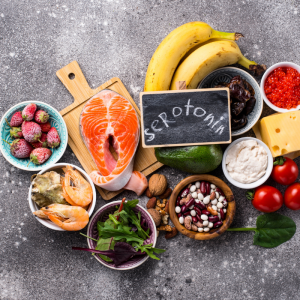 Consume some complex carbohydrates with your evening meal. As discussed in my earlier post, A Duo of Dreamland Dinners, this will cause a rise in insulin. Insulin will increase the binding of most amino acids other than tryptophan to be sent to muscle tissue for repair and maintenance. This reduces competition for tryptophan in crossing the blood-brain barrier, so most of it gets to the brain. Tryptophan is a precursor in the production of serotonin (a calming hormone). Serotonin, in turn, is the precursor to melatonin (which signals the body to prepare for sleep). So more tryptophan in the brain leads to better sleep.
Consume some complex carbohydrates with your evening meal. As discussed in my earlier post, A Duo of Dreamland Dinners, this will cause a rise in insulin. Insulin will increase the binding of most amino acids other than tryptophan to be sent to muscle tissue for repair and maintenance. This reduces competition for tryptophan in crossing the blood-brain barrier, so most of it gets to the brain. Tryptophan is a precursor in the production of serotonin (a calming hormone). Serotonin, in turn, is the precursor to melatonin (which signals the body to prepare for sleep). So more tryptophan in the brain leads to better sleep.
Note that tryptophan is also a precursor for synthesizing vitamin B3 (Niacin). Niacin is a critical vitamin. It is needed to convert carbohydrates to glucose, to metabolize fats and protein and is vital to the nervous system. It is also needed to make adrenal hormones including cortisol, our main stress hormone. As a result, if tryptophan stores are low, the body may prioritize its use to synthesize niacin. This leaves less available for serotonin and melatonin production. As stress depletes cortisol, it depletes niacin as well, another reason why stress may interfere with sleep.
So be sure you are getting abundant tryptophan in your diet by eating sufficient protein each day (20 to 30 grams with every meal). While the body can store carbohydrates and fat, it does not store protein. So you need to consume what you require throughout each day. Foods which contain high levels of tryptophan include most animal products. Examples include chicken, turkey, lamb, beef, fish and shellfish, eggs and dairy products. Nuts and seeds, grains, beans and lentils are good plant sources, as are dark leafy greens, bananas and potatoes. Other foods thought to help boost serotonin in the brain include strawberries and dates.
For a satisfying slumber, it is also wise to avoid large meals late at night as they can upset your digestion. And too many beverages in the evening can have you waking to head to the bathroom more often that you might like.
Be safe about supplements
Tryptophan is available as a supplement as well. It comes in varying forms and quality levels and there are circumstances where supplemental tryptophan is not appropriate. So it is best to talk to a knowledgeable health care practitioner about your particular situation before turning to supplementation. This is good advice for other supplements you may be considering to help your sleep as well. Some of the more common ones include melatonin, magnesium, L-theanine and GABA (the neurotransmitter gamma-aminobutyric acid, which exerts a calming effect on the brain). The same goes for herbal remedies such as passionflower, valerian, chamomile and lavender. I happen to love putting my head down on a pillow I have just misted with lavender spray.
Be wise about exercise
While it is healthy to exercise, doing so too close to bedtime may be very stimulating and interfere with sleep. So keep an eye on whether this is the case for you. Exercise, in general, boosts satisfying slumber. It reduces stress, increases fatigue and raises body temperature, so that the resultant drop afterwards can help induce sleepiness. Exercising outdoors is a great way to get that natural light exposure we talked about earlier.
Make relaxation a ritual
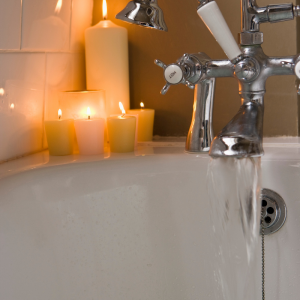 While I am loathe to admit it, I definitely have more satisfying slumber if I read a good book or listen to relaxing music before heading to bed than I do if I’ve just binged watched a bunch of episodes of my favourite psychological thriller/murder mystery/police procedural on Netflix. So I recommend stopping at one episode. Then switch to a soak in the tub (as mentioned earlier), a good book and/or some soothing music.
While I am loathe to admit it, I definitely have more satisfying slumber if I read a good book or listen to relaxing music before heading to bed than I do if I’ve just binged watched a bunch of episodes of my favourite psychological thriller/murder mystery/police procedural on Netflix. So I recommend stopping at one episode. Then switch to a soak in the tub (as mentioned earlier), a good book and/or some soothing music.
Meditation is very effective at calming the “busy brain” and sending us off to slumber. Apps like Calm have evening meditations and even bedtime stories to listen to. One of the more effective ones they released recently was a BBC announcer reading from the General Data Protection Regulation! There are lots of free resources on the internet as well, like this guided meditation for sleep by the renowned mindfulness teacher and psychotherapist Tara Brach.
Don’t lie awake staring at the ceiling
If you are still awake after 20 minutes in bed, go to a dimly lit room and, again, read or listen to soothing music. Lying in bed awake and worrying about it will only cause anxiety. This will only make it even harder to fall asleep.
Prioritize your sleep
I will put this blog post to bed with a final quote from Dr. Walker about the importance of making sleep a priority:
“Regardless of the amount of recovery opportunity, the brain never comes close to getting back all the sleep it has lost.”
Remember this. And sleep well!